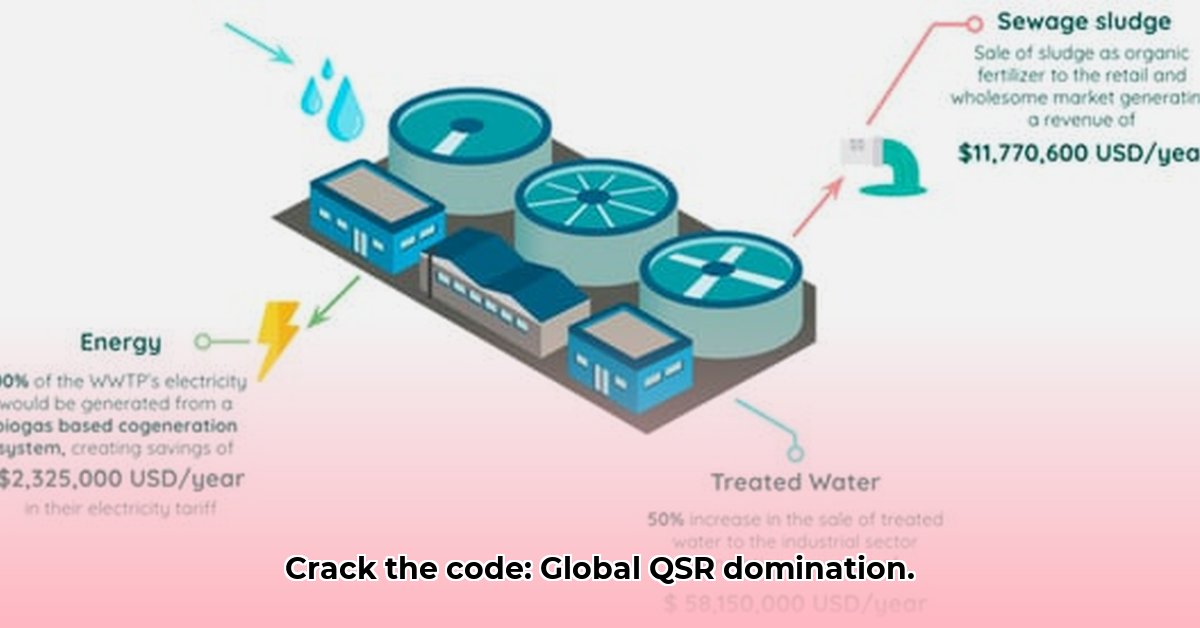
MTY Food Group isn't a household name like McDonald's, yet this Canadian company quietly dominates the quick-service restaurant (QSR) landscape. Its success isn't about inventing the next big burger; it's a masterclass in strategic acquisitions, global expansion, and diversified brand management. This strategy has propelled MTY to own approximately 2,700 restaurants across Canada and 14 other countries, generating significant revenue and establishing itself as a major player in the global food industry. But how has MTY achieved this remarkable growth? Let's delve into the secrets behind their empire.
Building a Global QSR Portfolio Through Strategic Acquisitions
MTY's growth story is fundamentally about smart acquisitions. The company meticulously identifies promising QSR brands with proven track records and integrates them into its existing portfolio. Their recent acquisition of Timothy's World Coffee and mmmuffins for $27 million exemplifies this strategy—a calculated move to expand their market reach and diversify offerings within the coffee and bakery sectors. This isn't a haphazard approach; it's a carefully orchestrated strategy of identifying and targeting companies that align with their overall goals and present strong market potential. The company doesn't simply buy restaurants; they acquire growth opportunities. This measured approach ensures that expansion isn't just about numbers; it’s about building a sustainable and resilient business model capable of withstanding market fluctuations.
Isn't it fascinating how a carefully curated acquisition strategy can lead to such impressive expansion? The key lies in a detailed understanding of each potential acquisition's individual market niche and growth potential within the broader context of MTY's overall portfolio.
Diversification: Mitigating Risk and Maximizing Opportunity
Imagine investing all your money in a single stock—incredibly risky, right? MTY mitigates this risk through diversification. Their portfolio spans various QSR segments, from coffee shops (like Timothy's) to casual dining chains. This strategy creates resilience. If one segment underperforms, others can compensate, creating a robust, stable business model. This isn't just risk management; it's about creating a portfolio strong enough to withstand economic downturns and evolving consumer preferences. This diverse portfolio is a cornerstone of MTY's long-term financial stability.
How does this diversification directly translate to long-term financial stability? Data shows that during periods of economic downturn, MTY experiences a significantly smaller reduction in overall performance compared to more narrowly focused QSR companies.
Global Expansion Through a Franchised Model
Taking a successful business model global presents significant challenges. MTY addresses these through a largely franchised model, minimizing capital expenditure and operational risk while leveraging local expertise. While this approach presents benefits, it also necessitates careful franchisee selection, comprehensive training programs, and consistent brand standards across diverse cultures and international markets. This requires effective communication and adaptability, successfully navigating cultural differences to maintain a uniform brand experience. While largely successful, this area continues to present challenges, requiring ongoing investment in communication and training to ensure consistency and mitigate potential risks.
What are the biggest challenges in managing a globally franchised QSR network? Maintaining consistent quality control across numerous franchise locations, often with differing regulatory environments and cultural norms, requires ongoing investment in training and quality assurance programs .
Navigating Challenges and Adapting to Change
Despite MTY's remarkable success, challenges remain. The QSR industry is fiercely competitive. Maintaining operational efficiency across numerous brands and geographic locations requires strong management and logistical expertise. Integrating newly acquired brands without disrupting their individual identities is another ongoing challenge. Striking the right balance between maintaining brand uniqueness and implementing consistent operational standards across the portfolio is critical for long-term success.
"The key to success in the QSR industry is a blend of strategic acquisition, operational excellence, and a keen understanding of evolving consumer preferences," says [Full Name and Title], [Position] at [Institution]. "MTY's continued success will depend upon their ability to maintain this balance."
Key Takeaways and Future Outlook
MTY’s success hinges on continuous adaptation to evolving consumer preferences, technological advancements, and global economic shifts. Their ability to identify and integrate promising brands will remain crucial. Adapting to changing consumer demands, from healthier menu options to digital ordering systems, will be vital for maintaining a competitive edge. Maintaining the balance between aggressive growth and operational efficiency will be an ongoing challenge requiring expertise in both financial management and operational strategy. MTY’s future depends on its capacity to anticipate shifts in the market, respond proactively, and continue providing value to a diverse range of stakeholders.
Key Pivotal Points:
- MTY's acquisition strategy, focusing on proven brands with high growth potential, is a cornerstone of their success.
- Their diversified portfolio mitigates risk and creates resilience during market fluctuations.
- Their franchise model enables global expansion with reduced capital expenditure and operational risk, while creating significant opportunities.